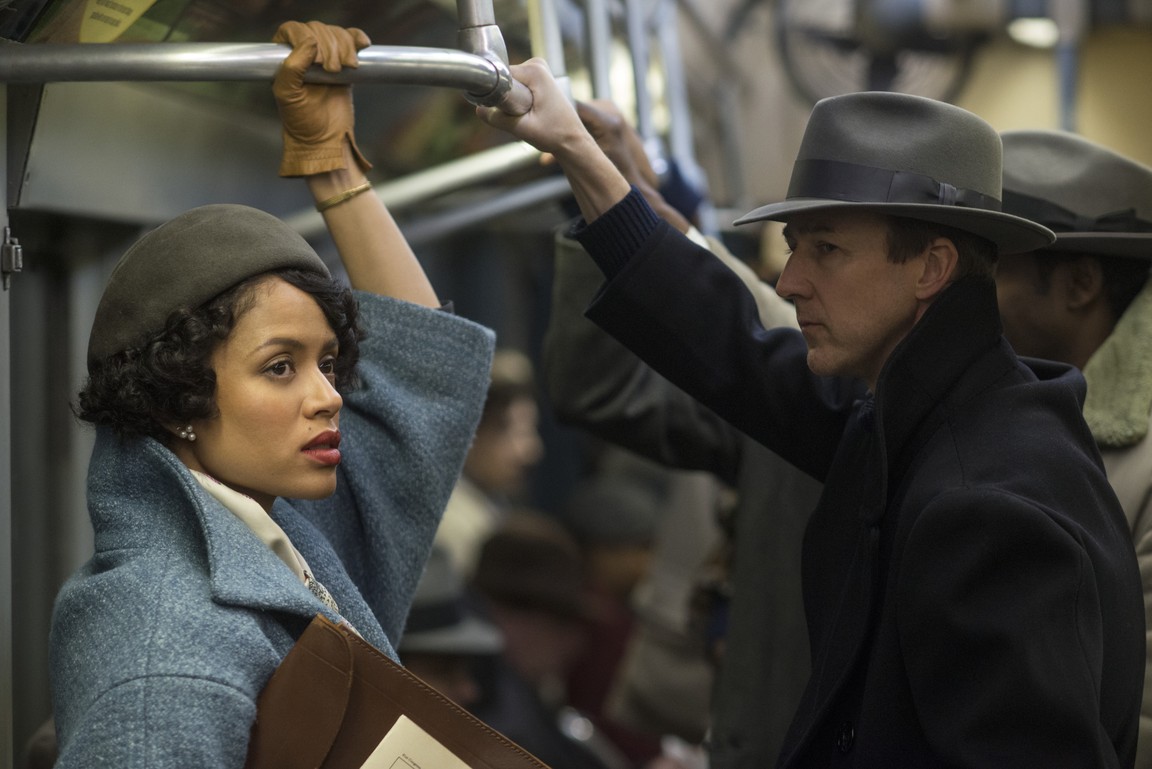Motherless Brooklyn
Posted on October 31, 2019 at 5:37 pm
B +| Lowest Recommended Age: | Mature High Schooler |
| MPAA Rating: | Rated R for language throughout including some sexual references, brief drug use, and violence |
| Profanity: | Very strong language |
| Alcohol/ Drugs: | Drinking, smoking, drug use |
| Violence/ Scariness: | Peril and violence including guns, characters injured and killed |
| Diversity Issues: | A theme of the movie |
| Date Released to Theaters: | November 1, 2019 |
| Date Released to DVD: | January 27, 2020 |

“Motherless Brooklyn” is the affectionate (really) nickname given to Lionel Essrog (Edward Norton) by the only person to treat him kindly, Frank Minna (Bruce Willis). Lionel grew up in an orphanage where his odd tics and compulsions made him the target of bullies who called him a freak. Minna, a private detective, saw something in Lionel, saw that the same compulsions that others found jarring would make him valuable as a close observer who would not be able to rest until he solved the mystery. “A piece of my head broke off and keeps joyriding me for kicks,” he says. But”if there’s one thing my pain in the ass brain knows how to do it is how to listen and remember things.”
Writer/director/star Edward Norton adapted Jonathan Lethem’s prize-winning book, shifting its setting from the 1990’s to the 1950’s, with an intricate “Chinatown”-like storyline of betrayal, corruption, and money. Alec Baldwin plays Moses Randolph, a character clearly inspired by “master builder” Robert Moses, who remade the face, footprint, and culture of New York City. He was never elected to office but held as many as twelve titles in city government, overseeing the construction of highways, parks, and bridges. We first see Baldwin as Randolph striding into a meeting and contemptuously ordering the mayor to give him authority over pretty much everything. How this will all tie into the murder of Frank Minna is what Lionel will have to find out. And there’s a beautiful woman with a secret, as there always is in a noir story. Here is is Rose (Gugu Mbatha-Raw), working to protect the people who are being displaced, with an unexpected additional connection to the story.
Norton’s narration and twitchy performance immerse us in what he sees and what he is looking for and the outstanding production design by Beth Mickle and superbly moody core by Daniel Pemberton immerse us in post WWII New York. We can almost smell the luxurious leather on the books and chairs in an office with a fabulous view of the city to the old Penn Station to a smoky jazz joint in a black neighborhood. And the murkiness of the settings and the sinuous, boundary-crossing music emphasize the ambiguities faced by the characters.
Unlike most stories distorted by power and corruption, Randolph is not lining his own pockets. He argues that he is doing what’s best for the city — building bridges that make it possible for employers to have access to people who live outside of Manhattan, parks and beaches to give residents something more than jobs to attract them. So, if he has to cut some corners, displace poor people, and bury some secrets and maybe a couple of bodies, isn’t that just what it takes to get things done? “As long as you’re the guy who built the parks, you’re with the angels.” At least to some people. Norton, whose grandfather was a developer with an excellent reputation for integrity and public spiritedness, is very aware of the conflicts involved in “gentrification” and choosing between protection and honoring the old and improving with the new, between an orderly process that gives everyone a chance to participate and a bureaucratic tangle that prevents any progress.
This has been a labor of love for Norton, who has worked on and off for 20 years to bring Lethem’s characters to the screen. In only his second film (after “Keeping the Faith”) as a director, he brings an assured understanding of structure and tone. In one especially compelling scene, Lionel finds that a jazz performance connects with the rhythms of his brain and we see what it is like for him to experience a sense of home. The story itself is like a jazz performance, improvisation based in deep understanding and skill.
Parents should know that this is a noir-esque murder mystery with extended peril and characters who are injured and killed, some graphic and disturbing images, bullying, strong language, drinking, smoking, drugs, and sexual references and a a non-explicit sexual situation.
Family discussion: How does Lionel turn his challenges into a strength? What matters most to Moses Randolph? Who is referred to with the quote from Shakespeare about using a giant’s strength like a tyrant?”
If you like this, try: “Chinatown” and classic noir films like “The Woman in the Window” and “Touch of Evil”

